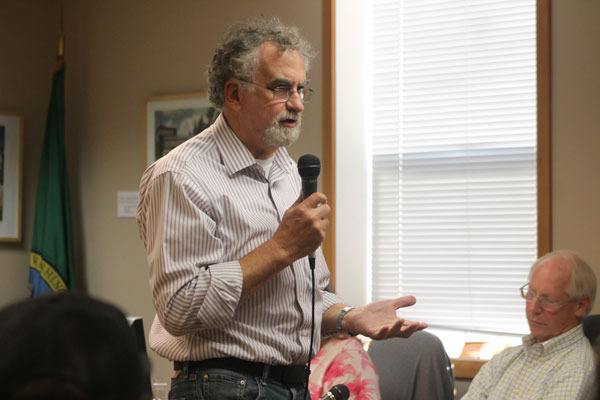The Dog House Tavern land swap deal is still on the table and is actively being pursued, Langley city leaders affirmed this week.
They made that clear after a lengthy discussion of the recent events at Monday’s city council meeting, events that led to the historic building’s owners feeling stonewalled and misled by Mayor Fred McCarthy and the city planner, the city council thinking its legal advice had somehow changed over the past year, and the mayor offended by the owners’ remarks. Moving ahead, Langley scheduled a Sept. 8 public hearing on the partial street vacation, which was identified as a missing step in the process and one of the problems that led to the recent misunderstandings.
“I believe we can move forward at this point,” Director of Community Planning Michael Davolio said.
Langley’s contracted attorney, Jeff Taraday of Lighthouse Law Group in Seattle, attended the meeting at the request of the council. Several council members wanted clarification after an earlier meeting led them to believe the legal advice about the land swap had changed.
The council was under the impression the land swap deal had been vetted with Taraday and approved, voting unanimously in March in support of the trade over 620 square feet for the Kleiners and 175 square feet for the city.
“If we weren’t sure of what we were doing, why’d we do it?” Councilman Bruce Allen asked.
As Taraday had previously advised a past planning director, giving up part of a road that leads to marine access is difficult, but it is not impossible. Taraday said it seemed to be a difference of interpretation by different city planning directors. His perception of how the confusion came about was supported by Councilman Jim Sundberg.
“The devil is in the details,” he said, adding that perhaps some institutional knowledge was lost when previous planning director Jeff Arango left in fall 2014.
Reading through state code RCW 35.79.035, Taraday listed the three ways that a city can give up, even partially, part of a road that leads to a body of freshwater or saltwater. Langley’s best option was the third “test,” as Taraday called it. Specifically, section 1(c) allows the city to implement its comprehensive plan to improve public access to the same shoreline area and give up a road. One of the basic limitations for a municipality is that it cannot give away or make a gift of public funds or assets, meaning that no matter how little the land meant to the city’s future, Langley could not just give it away without an appraisal and fair market value.
The land swap deal would give building owners Charlie and Janice Kleiner a sliver of property adjacent to the west side of the building that is technically part of Anthes Avenue. It would also give the Kleiners property on the back, water-facing side of the Dog House. Both pieces total about 620 square feet. Upon that area they plan to build three decks at each floor.
They are giving up 175 square feet on the property’s north side, closest to the waterfront and essentially adding to Seawall Park.
The Kleiners attended the city council meeting and listened to the description of events since they purchased the 100-year-old building on First Street in 2010. After the city’s report, Janice Kleiner was allowed to speak and thanked the council for its support.
“Thank you, again, for helping us move it further,” she said.
But she said she and her husband were never informed by the planner or mayor that an elevator, only recently pitched to them by city administration, would have been in lieu of the land swap. They never would have entertained the idea if that had been made clear, she said.
The elevator was a major surprise to the council at its Aug. 3 meeting when the Kleiners informed them of being approached by McCarthy and Davolio. Thinking that a public-private partnership to build an elevator into the Dog House and have it meet with First Street would help mobility-impaired people access the waterfront and provide a public view improvement, the project would have satisfied section 1(b) of RCW 35.79.035.
That option would not, however, have worked for the Kleiners, who have stated they need to own the land that the building sits on and where they want to expand it in order to secure financing for remodel and restoration work.
At least one city councilman didn’t think there would be much, if any, opposition to the partial street vacation next month.
“The land swap didn’t have any opposition, so I can’t imagine the street vacation would,” Sundberg said.



